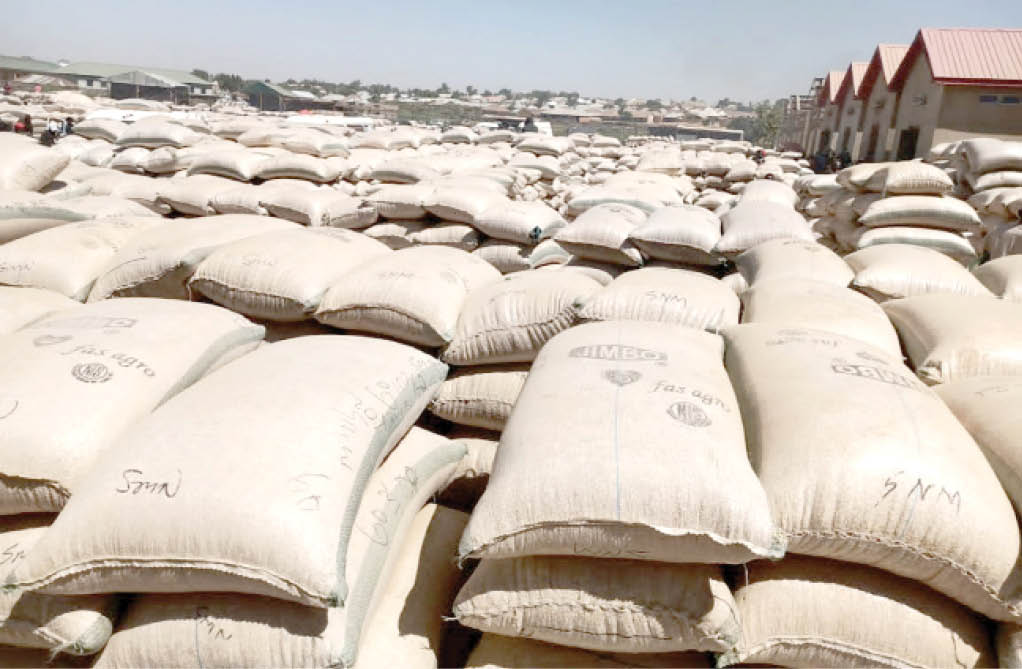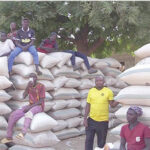The suspension of major animal feed producers from the buying of maize and sorghum across the country has left many farmers and merchants with grains in their stores.
Daily Trust reports that Olam Nigeria Limited, a leading poultry feed producer; and Premier Feed Mills Limited (PFM), a subsidiary of Flour Mills Nigeria Plc; announced the immediate suspension of maize and sorghum offtake due to the current state of food insecurity in Nigeria and to maintain market stability.
While the companies acknowledged that the prices of maize and sorghum had been artificially high, their suspension in offtaking was believed to have contributed to forcing down the prices of grains across some Northern states last week.
However, many farmers and merchants in the Northern states where maize and sorghum fields stretch far and wide, said the decision by the animal feed producers could lead to post-harvest losses.
Kebbi hunters kill suspected rustler, recover 74 cows, cables
Edo: FRSC arrests 2,147 in 1 month
The strategic pause by Olam and Premier Feed Mills, according to an agricultural economist, is a response to a complex confluence of economic pressure, including inflation and supply chain disruptions exacerbated by global events.
Nigeria, according to the Food and Agriculture Organisation (FAO), is presently faced with serious food insecurity which has disrupted the food systems, reduced incomes and increased the poverty level of the population.
In its November, 2023, report, FAO disclosed that 26.5 million Nigerians were projected to be food insecure in 2024.
Farmers fear losses
Daily Trust gathered that the decision to pause maize and sorghum offtake by animal feed producers had inadvertently placed a burden on grain merchants who had long relied on big animal feed producers to offtake their grains.
“We are at a loss; our crops are ready but our usual market is closed. We have stocks of grains waiting for buyers,” lamented Alhaji Musa Abdullahi, a sorghum farmer in Kano State who has 10 hectares in Wudil LGA.
Alhaji Shafiu Umar, who identified himself as one of the local merchants supplying grains to Olam Nigeria from the Dawanau International Grain Market in Kano State, expressed disappointment with the company’s suspension of grain purchase.
“I am very disappointed by Olam’s decision because I have been supplying maize to them for the past two years, and they have been reliable and fair buyers. They always pay on time and offer us good prices.
“Now that they have stopped buying from us, I have a lot of maize in stock. I can’t find other buyers who can match Olam’s offer and I don’t want to sell at a loss,” he said.
In Kaduna State, where one of Olam’s largest poultry feed mills is located, Alhaji Musa Umaru, a sorghum merchant at the Tudun Sabiu Grain Market in Soba LGA, said Olam’s decision could cause grain surplus.
“The implication of this is that if local farmers are not able to sell their harvest to other buyers or store them properly, there could be post-harvest losses as the grains may spoil. This could also reduce the availability and quality of the produce as farmers will be waiting for better offers to sell their grains,” he said.
Although the suspension of offtaking by animal feed producers is likely to result in surplus which could crash the price of grains in the market, farmers like Alhaji Musa Umaru are still sitting on large quantities of produce and say they are not willing to sell at a loss.
Alhaji Bara’u Aliyu, known as Sakataren Hakimin Yelwan Bawa, a grain merchant in Kaduna State, said Olam’s offer on their grains was the best.
“Apart from Olam, we also sell our grains to other companies, but we have to bargain at good prices because we also bought the current grains at high costs. Before Olam’s suspension, we supplied them with at least 20 trucks of grain daily and they offered the best prices.”
In its announcement, Olam said it would resume its procurement of grains from local farmers as soon as the market situation stabilised and became favourable for both parties.
When asked if the company had found other alternative sources of maize and sorghum for its poultry animal feed, Olam Nigeria’s Vice President and Head of Corporate and Government Relations, as well as the overseer of External Communication and Stakeholder Management, Ade Adefeko, reiterated the company’s current stance of non-disclosure.
“A statement was issued last week and no further comments for now,” Adefeko told this reporter.
Decision will crash prices but cause wastage – Expert
An agricultural economist at the Kano State University of Science and Technology (KUST), Wudil, Dr Umar Shehu Umar, said the decision of animal feed producers to suspend offtake from farmers and merchants could affect the country’s food security.
Dr Umar explained that the decision would likely reduce the income and market access of local farmers, as well as increase surplus and wastage of grains.
While noting that the decision had two conflicting effects on food security, he explained that, “On the one hand, it may increase people’s access to affordable food. This is because excess stocks left hanging in the market will force the commodities’ prices to come down. Thus, a positive contribution to food security.
“On the other hand, farmers may panic and start selling to any available buyer or those offering reasonable prices to avoid a price crisis. This may send many farmers out of business, especially if the production involves asset-specific investments, which hurts the agri-food chain and food security by extension.”
He further explained that the significant implication of the decision of animal feed producers would lower commodity prices because of the cut-off demand but might likely send farmers out of business, creating an imbalance in the agri-food chain.
He noted that the decision would provide temporary price relief to the feed companies and consumers in the short-term but create a more significant food security crisis in the long run.
Dr Umar, however, said that if the prevailing market price was greater than the ceiling price pegged by companies such as Olam as their highest possible purchase price, the companies could not produce profitably.
He said the best decision might be for animal feed processing companies to quit offtaking from farmers if other alternatives exist.
Risk of food inflation
As Nigeria’s annual inflation continues to rise, exacerbated by the removal of fuel subsidy, prices are projected to stay above average according to a report jointly published by the World Food Programme (WFP) and the Food FAO in December, 2023.
This was attributable to the limited production performance, sustained demand, continuing trade disruptions and other security and socio- economic challenges.
The report, titled: “West Africa Regional Supply and Market Outlook”, further revealed that traders would likely withhold stocks in anticipation of prices rising, thereby reducing market supplies. It also stated that staple market prices of crops such as maize, sorghum, wheat and rice would rise to higher levels than currently projected.
FAO reported that Nigeria imported about 4.7 million tonnes of maize and 1.3 million tonnes of sorghum in 2018, while it received about 300,000 tonnes of grains from WFP in 2020. But in December, 2023, FAO forecasted a huge decline of 42 per cent in maize, sorghum and millet production due to agro-climate challenges and rising production costs.
Though the decision of Olam Nigeria and PFM to suspend offtake was aimed at maintaining market stability, some maize and sorghum merchants said they had found alternative poultry feed producers that offered better prices.
Alhaji Bara’u Aliyu, a grain merchant in Kaduna State, said, “We now sell our grains to an Indian poultry farm in Abuja which buys the grains better than the purchasing price of Olam. And we also sell it to the Dawanau Market in Kano and other poultry farms across Nigeria, especially in Ibadan and Warri.”

 Join Daily Trust WhatsApp Community For Quick Access To News and Happenings Around You.
Join Daily Trust WhatsApp Community For Quick Access To News and Happenings Around You.


